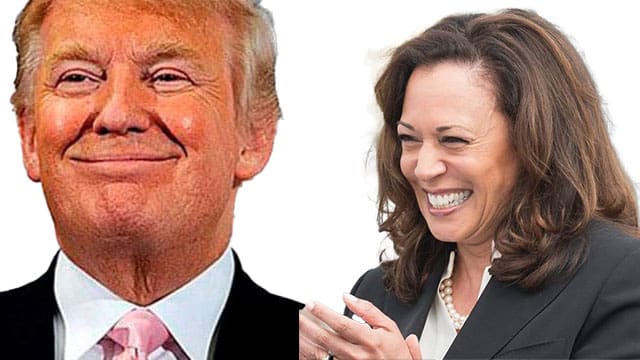The second presidential debate between Trump and Harris was closer than you think

For interview requests, click here
There have been two U.S. presidential debates in 2024, and according to the polls, each had a clear winner. I’m going to show why this belief, particularly with respect to the second debate, is mistaken.
The first presidential debate, sponsored by CNN, took place on Jun. 27. Former U.S. President (and then-presumptive Republican presidential candidate) Donald Trump went up against President (and then-presumptive Democratic presidential candidate) Joe Biden.
The second presidential debate, sponsored by ABC, took place on Sept. 10. By then, Trump had secured the Republican nomination. He faced off against Vice President Kamala Harris, who became the presumptive Democratic candidate after Biden dropped out in July. Her nomination was confirmed in August.
A majority of TV viewers felt the Biden-Trump debate was a one-sided affair – and a debacle for the sitting President. ABC News/Ipsos suggested that Trump won by a staggering 66-28 percent margin. Seems quite logical, all things considered.
A majority of TV viewers also felt the Harris-Trump debate was a one-sided affair – and a debacle for the former President. ABC News/Ipsos suggested that Harris won by a 58-36 percent margin. In other words, a reversal of the first debate.
 |
| Recommended |
| Who won the Presidential debate? Check out their body language
|
| Why the U.S. vice presidency appeals to rising politicians
|
| Covering up U.S. Presidents’ illnesses is nothing new
|
I believe the general perception of the second presidential debate was incorrect. If you properly weigh the pros and cons of both candidates that night, you’ll discover that it was a draw.
Why the discrepancy?
I’ve analyzed Canadian leaders’ debates, U.S. presidential debates and other significant international political debates in print, radio and TV for decades. Winning a debate is extremely hard to achieve. Leaders go through an enormous amount of preparation. This includes a boatload of potential questions, follow-ups and redirections, canned (or memorized) lines, facts and figures, and mock debates with someone imitating their political opponent. While a few mistakes will undoubtedly happen on debate night, most pitfalls, trip-ups and holes in logic are typically dealt with during debate prep.
The first U.S. presidential debate of 2024 was a rare instance of a clear winner and loser. Biden stumbled repeatedly with his words, lost his train of thought multiple times, and was difficult to follow throughout. Trump’s overall performance was consistent and measured. Except for hardcore Democratic partisans, most Americans were able to determine that Trump had easily beaten Biden. It wasn’t even close.
This wasn’t the case with the second presidential debate.
Trump definitely underperformed. He started well and fell off the rails before recovering near the end. He didn’t always look sharp and seemed angry or agitated at others. He also fell into a couple of traps he should have been able to avoid. In particular, the ludicrous statement, based on an unsubstantiated online claim, that Haitian migrants were “eating dogs” and “eating the cats” in Springfield, Ohio.
Harris exceeded expectations in her performance. She struggled at first but was able to find her footing and became more confident when answering questions. She maintained a positive, upbeat tempo throughout most of the debate. She scored well when dealing with softer topics and was able to handle the discussion on abortion effectively.
That’s how the majority of viewers likely perceived the debate performances of the two candidates. The difference in expectations in the pre-debate period had a significant effect on the post-debate analysis.
Here’s the problem: many other intangibles needed to be considered. Why weren’t they? Some analysts and commentators failed to account for these factors, a critical oversight that can’t be ignored. Others conveniently ignored them due to an intense dislike of Trump, which was unacceptable.
Let’s briefly go through a few of them.
Trump was the only candidate to address economic issues like taxes and fracking, though he didn’t spend much time on it. Still, it was more than Harris, who largely avoided discussing policy or substantial matters. Her responses, in contrast to Trump’s, felt canned and memorized. She often seemed unsure and sounded vacuous when the conversation shifted to topics outside her comfort zone. While Trump could have benefited from using some canned lines, that’s never been his debating style.
While Trump made several missteps, Harris also stumbled in a way that wasn’t widely reported. When Trump’s controversial comments about her biracial roots were discussed, he responded: “I couldn’t care less, whatever she wants to be is OK with me.” This was a good tactic to use. Instead of leaving it at that or responding in a more positive way, Harris shifted to a typical left-wing stance on race relations, calling it “a tragedy” that Trump continues to “use race to divide the American people.” This negative turn didn’t fit the tone of the discussion and wasn’t a wise choice.
Trump’s decision to primarily look directly at the camera was widely criticized. There’s actually nothing wrong with this approach – former Canadian Prime Minister Stephen Harper successfully used this technique during the 2011 election – but Trump often came across as angry or moody. In contrast, Harris alternated between looking at the camera and the moderators, maintaining a generally pleasant demeanour. While her approach made sense, her exaggerated facial expressions when Trump spoke were overly animated and even ridiculous at times. Truth be told, neither candidate managed their stage presence particularly well.
I also have to mention the horrid performance of the two ABC moderators, Linsey Davis and David Muir. They clearly favoured Harris throughout the debate, a fact noted by many political commentators and body language experts. While the Trump team expected some disadvantages – the case for most Republican presidential candidates – their bias was worse than anticipated. It boosted Harris’s performance while putting Trump at a significant disadvantage.
When you put all of this together (and more), the Harris-Trump debate was a draw. There was no clear winner, in spite of what some are suggesting. Just like most U.S. presidential debates of the past 60 years, in fact.
Michael Taube is a political commentator, Troy Media syndicated columnist and former speechwriter for Prime Minister Stephen Harper. He holds a master’s degree in comparative politics from the London School of Economics, lending academic rigour to his political insights.
Explore more on U.S. politics, Donald Trump, Kamala Harris
The opinions expressed by our columnists and contributors are theirs alone and do not inherently or expressly reflect the views of our publication.
Troy Media
Troy Media is an editorial content provider to media outlets and its own hosted community news outlets across Canada.

